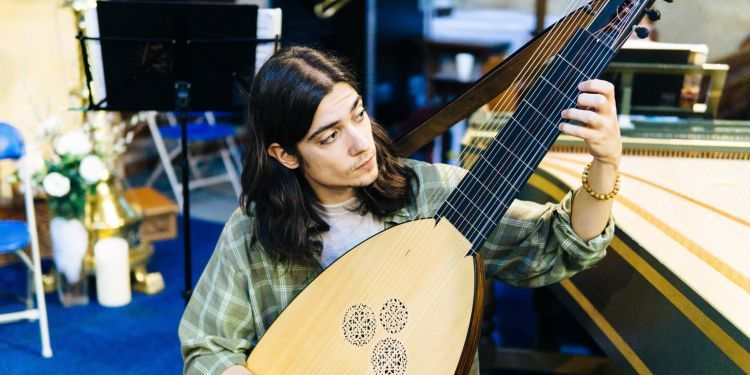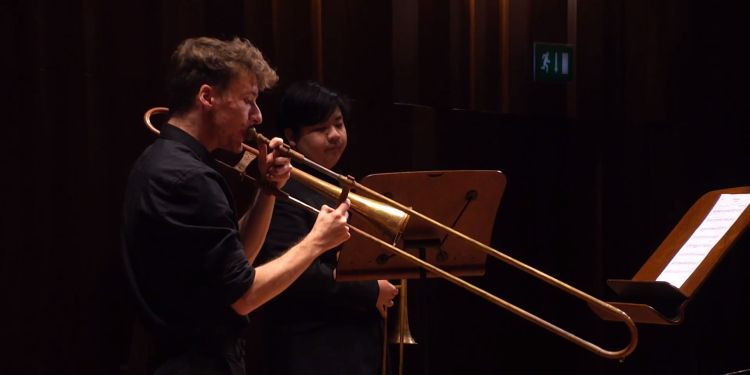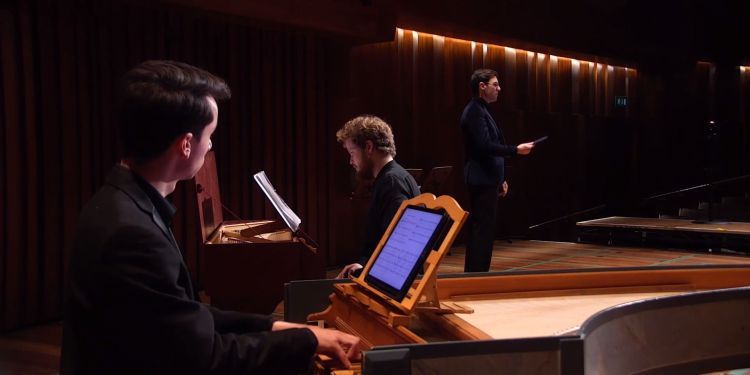
Breadcrumb navigation
Historical Performance
Historical Performance at Guildhall encourages students to inhabit music from the past and explore ways of communicating with a modern audience.

Historical Performance at Guildhall
Teaching
Under the supervision of Head of Historical Performance, Christopher Suckling, the Department provides opportunities for students to critically engage with and challenge current performance practices before entering an evolving profession.
Through a combination of ensemble and project-based learning, supported by individual tuition from some of the country's leading performers, studies centred around rhetorical delivery and historical stagecraft provide an introduction to a different ethos to performing music, giving you the experience necessary to continue your development as you embark on a varied career.
Recurring projects include Baroque Opera Scenes, the Baroque Orchestra (including a side-by-side project with the Academy of Ancient Music), the Cantata Project, and the Guildhall Consort. These projects are mutually supportive; instrumentalists, for example, might first encounter the seventeenth century by playing in consort with singers whilst vocalists develop stylistically through performing with experienced continuo players. These projects can be supported through a Research Elective which gives students the opportunity to develop their own practice-as-research projects.
Associations
Our relationship with the Academy of Ancient Music offers students masterclasses with principal players and side-by-side ensemble workshops and performances. The partnership also allows access to major artists working with the AAM, to AAM open rehearsals and to networking opportunities.
The Guildhall Consort is directed by Eamonn Dougan, Assistant Conductor of The Sixteen, and offers excellent opportunities for refining vocal ensemble techniques. For continuo players, working with Eamonn and his colleagues offers an intensive experience in coaching and directing. The Consort has also formed the chorus for performances in the Barbican Hall with visiting ensembles such as the Venice Baroque Orchestra and the English Concert.

Performance & Collaboration
Studying music at an internationally-renowned conservatoire means you can become immersed in a world of performance from day one.
Study Pathways
Postgraduate performers on keyboards and plucked continuo instruments (including those who also have an interest in vocal accompaniment, coaching, and directing) find their home within the Historical Performance department. Generous scholarships and fee-reductions are available in return for their weekly work with Vocal Studies and their support of cross-school ensembles.
In addition to principal study lessons, teaching is centred around weekly continuo classes and historical stagecraft classes. Performance platforms give the space to discuss both playing and wider concerns surrounding historical performance, whilst projects paced over a term offer a deep approach to a specific repertoire or aspect of our craft.
Prospective students may apply for both Guildhall Artist Masters and Artist Diploma programmes. Students are also welcomed into the department through the MPhil/DMus and MPhil/PhD programmes.
Keyboard and plucked continuo instruments should apply as Historical Performance Keyboards, Historical Performance Guitar/Theorbo/Lute, or Historical Performance Harp.
Audition requirements for continuo instruments can be found on our auditions page.
Singers interested in historical performance should join the Vocal Studies Department, taking advantage of the breadth of technical and performance training necessary for a singer, whilst being able to choose performance projects, masterclasses and electives that are led by the Historical Performance department.
In addition to project-based work, singers are frequently welcomed into weekly principal study classes, forming close relationships with a continuo team. They receive coaching in performance platforms, work on declamation through historical stagecraft, and gain insight into ensemble dynamics in continuo classes.
Performers of historical instruments are increasingly expected to be fluent in multiple idioms and on both modern and historical instruments.
Players of orchestral instruments opt to develop their skills on historical instruments through the Historical Performance elective modules of the undergraduate and postgraduate programmes; their Principal Study remains within the Strings, Keyboard or Wind, Brass and Percussion departments. The school has a collection of historical instruments to lend to students.
In addition to project-based work, instrumentalists are frequently welcomed into weekly principal study classes, forming close relationships with a continuo team. They receive coaching in performance platforms, work on declamation through historical stagecraft, and gain insight into ensemble dynamics in continuo classes..
Students can also join the department through the MPhil/DMus and MPhil/PhD programmes.
Applications & Contact
Applications
Keyboard and plucked continuo instruments should apply as Historical Performance Keyboards, Historical Performance Guitar/Theorbo/Lute, or Historical Performance Harp.
Audition requirements for keyboard and continuo instruments can be found on our auditions page.
Vocal Studies applicants with an interest in Historical Performance should apply apply via the Vocal or Opera principal study department. Applicants should also email music_applications@gsmd.ac.uk to register their interest in Historical Performance.
Orchestral Instruments should apply via their principal study department (Wind, Brass & Percussion or Strings) then select the relevant Historical Performance electives during their course.
For further information and to discuss whether Guildhall's approach to historical performance is suited to your developing career, please contact the Head of Department, Christopher Suckling.
For more information regarding Historical Performance department or auditions please contact HP@gsmd.ac.uk.
Historical Performance contact details
Michal Rogalski, Historical Performance Department Manager
Tel: 020 7382 7259
hp@gsmd.ac.uk
Highlights, Successes & Alumni
- The Guildhall Consort's staged performance of Gabriel (with Alison Balsom and the English Consort) at the Barbican and their critically acclaimed performance of Vivaldi’s Juditha Triumphans with Venice Baroque Orchestra and Magdalena Kožená (‘the choral singing from the Guildhall Consort was exquisite. Staggering, all of it, from start to finish.’ The Guardian, 5 stars).
- Side-by-side performances with the Academy of Ancient Music as part of the Deal Festival.
- Masterclasses with Richard Egarr, John Butt, Richard Tognetti, Aisslinn Nosky, Emma Kirkby, Edward Higginbottom, Jacob Heringman and principals from the Academy of Ancient Music
- Victoria and Albert Museum – students joined viol professor Liam Byrne in performances during his museum residency
- Cantata Project invitations to concert series at Hatchlands Park, Blackheath Concert Halls, St Martin-in-the-Fields, London Handel Festival, and Tilford Bach Festival.
- Joint research events in conjunction with ResearchWorks spanning Purcell to early-twentieth-century performing practices.
- New instruments, including organs by Jennings and Klop, a harpsichord by Malcolm Rose, new bows by Tim Richards and two baroque cellos by Clive Morris.
Recent competition prizes include:
- London International Festival of Early Music Competition
- International Johann Sebastian Bach Competition Leipzig
- York International Young Artists Early Music Competition
- Royal Over-Seas League Annual Music Competition
Students and recent graduates have joined ensembles including:
- Academy of Ancient Music
- Arcangelo
- Dunedin Consort
- The English Concert
- Gabrieli Consort
- Shakespeare’s Globe
- Orchestra of the Age of Enlightenment
- Orchestre Révolutionnaire et Romantique
Student ensembles are regularly selected for BREMF Live!, part of the Brighton Early Music Festival, while students, Fellows, and recent alumni have featured in every year of the Handel House Talent scheme since its inception.
- Christopher Suckling (Doctorate 2015), Head of Historical Performance, Guildhall School, Principal cello, Gabrieli Consort and Players
- Vladimir Waltham (Cello 2012), Principal cello, La Serenissima; Linos Piano Trio
- Adrian Horsewood (Historical Performance Voice 2008), Associate editor of Classical Music
- Nadja Zwiener (Violin 2001), Leader of The English Concert
- Eamonn Dougan (Voice 2000) Associate conductor, The Sixteen; Principal conductor, Britten Sinfonia Voices
- Marcus Barcham-Stevens (Violin 1997, Composition 2010), Monteverdi Choir and Orchestra
- Rachel Podger (Violin 1993), International soloist
- William Carter (Lute 1992), Academy of Ancient Music
- Robert Hollingworth (Voice 1989), Director, I Fagioloini
- Pavlo Beznosiuk (Violin 1982), International soloist and concertmaster
- Jane Booth (Clarinet 1988), Ensemble DeNOTE, Orchestra of the Age of Enlightenment, Tafelmusik (Canada)
- Neal Peres da Costa (Keyboard 1988), Associate Dean Research and Professor of Historical Performance, Sydney Conservatorium of Music (Australia)

Upcoming Events





